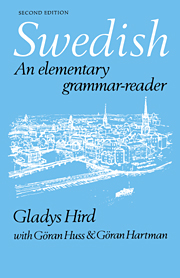Book contents
- Frontmatter
- Contents
- Preface to the second edition
- Acknowledgements
- Map of Sweden
- Map of Stockholm
- Note
- INTRODUCTION
- PART I GRAMMAR (illustrative passages, word lists, grammatical information and exercises)
- PART II READER (background information, texts, and questions on comprehension and appreciation)
- Den Starkare by August Strindberg
- I Summary of Grammar
- II Alphabetical list of strong and irregular verbs
- Select glossary of grammatical terms
- Index
Den Starkare by August Strindberg
Published online by Cambridge University Press: 05 June 2012
- Frontmatter
- Contents
- Preface to the second edition
- Acknowledgements
- Map of Sweden
- Map of Stockholm
- Note
- INTRODUCTION
- PART I GRAMMAR (illustrative passages, word lists, grammatical information and exercises)
- PART II READER (background information, texts, and questions on comprehension and appreciation)
- Den Starkare by August Strindberg
- I Summary of Grammar
- II Alphabetical list of strong and irregular verbs
- Select glossary of grammatical terms
- Index
Summary
August Strindberg is Sweden's first great modern dramatist, and the only one to have achieved a lasting international reputation.
He was born in Stockholm in 1849 and, after spending many years on the Continent, died there in 1912. Together with a fellow Scandinavian, Ibsen, who was his senior by twenty-one years, Strindberg is now recognized as one of the founders of modern theatre.
A prolific and erudite author, he is best known outside Sweden for his dramatic works, especially the early naturalistic plays – The Father and Miss Julie – and the later ‘fantastic’ ones – The Dream Play and The Ghost Sonata.
The miniature play which follows is an example of Strindberg's experimentation with the principles of naturalism as expounded by Zola.
Impressed by the quart d'heure plays of French avant-garde playwrights – ‘the drama reduced to one scene’ – and embarking on what was to be his short-lived Experimental Theatre in Copenhagen, Strindberg set out to write brief plays which would get to ‘the heart of the matter’ and achieve the ultimate in compression. Den Starkare (The Stronger), one of three such playlets, was written in 1888 and seems at one stage to have been intended as a curtain-raiser to his naturalistic tragedy Miss Julie.
The play, or rather sketch, consists of a monologue whose development reflects the past and present relationship of three people.
- Type
- Chapter
- Information
- SwedishAn Elementary Grammar-Reader, pp. 205 - 253Publisher: Cambridge University PressPrint publication year: 1980



